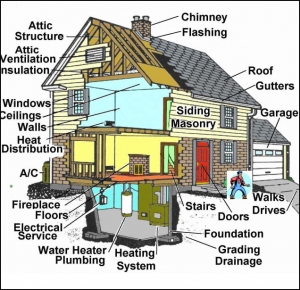Definition of an RI Home Inspection
A Rhode Island home inspection, as performed by me, a licensed home inspector and Certified Master Inspector, is a thorough visual inspection of all accessible systems of a property. I use tools, test equipment, and extensive training to translate signs I see into language you can use.
A simple example would be a stain on a ceiling, is not only a ceiling stain, but also a sign of water being somewhere it’s not supposed to be, like a leak from plumbing or a leak in the roof system. Any leak is considered urgent, with the use of moisture meters and in some cases thermal imaging we can see if its an old stain or still leaking.
I see signs like this everywhere, and they are not all that obvious. I use a standard operating practice with specific inclusions and exclusions.
In Rhode Island, there are state mandated laws dictating what is or isn’t required to be included in a home inspection, these are the bare minimums. We are allowed to , AND DO exceed the minimum in most areas. In an effort to make the industry better and have a higher standard scope of home inspections, we provide standard exceeding services to our clients!
For all intents and purposes, the RI home inspection and home inspection report create a “snapshot” of the condition of that property at the time of the home inspection. The client can then use the report to make educated decisions on purchase or course of action of a property.
A general RI home inspection is a non-invasive, visual examination of the accessible areas of a residential property, performed for a fee, which is designed to identify defects within specific systems and components defined by these Standards that are both observed and deemed material by the inspector. The scope of work may be modified by the Client and Inspector prior to the inspection process.
- The general home inspection is based on the observations made on the date of the inspection, and not a prediction of future conditions.
- The general home inspection will not reveal every issue that exists or ever could exist, but only those material defects observed on the date of the inspection.
A material defect is a specific issue with a system or component of a residential property that may have a significant, adverse impact on the value of the property, or that poses an unreasonable risk to people. The fact that a system or component is near, at or beyond the end of its normal useful life is not, in itself, a material defect.
A general RI home inspection report shall identify, in written format, defects within specific systems and components defined by Rhode Island state Standards that are both observed and deemed material by the inspector. Inspection reports may include additional comments and recommendations.
What I Inspect in a Standard Inspection
Safety
We put safety at the top of the list, and always look for safety concerns everywhere.
There are many misconceptions out there as to what a home inspection is and isn’t. Lets make it simple.
It is NOT a warranty or guarantee. My Buyers inspections do come with a 90 day warranty. I make observations, but can’t see into the future.
It is NOT an appraisal. I get asked on many occasions what the house is worth, or what it’s worth considering the findings of my inspection. I state facts on conditions and defects, nothing more or less.
It is NOT a tool to reference the property on another date. Conditions change, and if there’s been a reasonable amount of time lapsed, a re-inspection may be prudent.
It is NOT a technically exhaustive inspection. For example: I will operate your HVAC via normal controls, I will evaluate basic air flow, temperature changes etc…but not disassemble the unit to look inside. I am not responsible for dis-assembly of systems.
Inspectors will NOT move personal property to gain access to areas such as attics, etc…have access ways clear prior to the inspection.
Your home inspector DOES NOT WORK FOR THE REALTOR, I work for you, so your best interest is paramount, getting the most accurate information is the goal, nothing more, nothing less.


